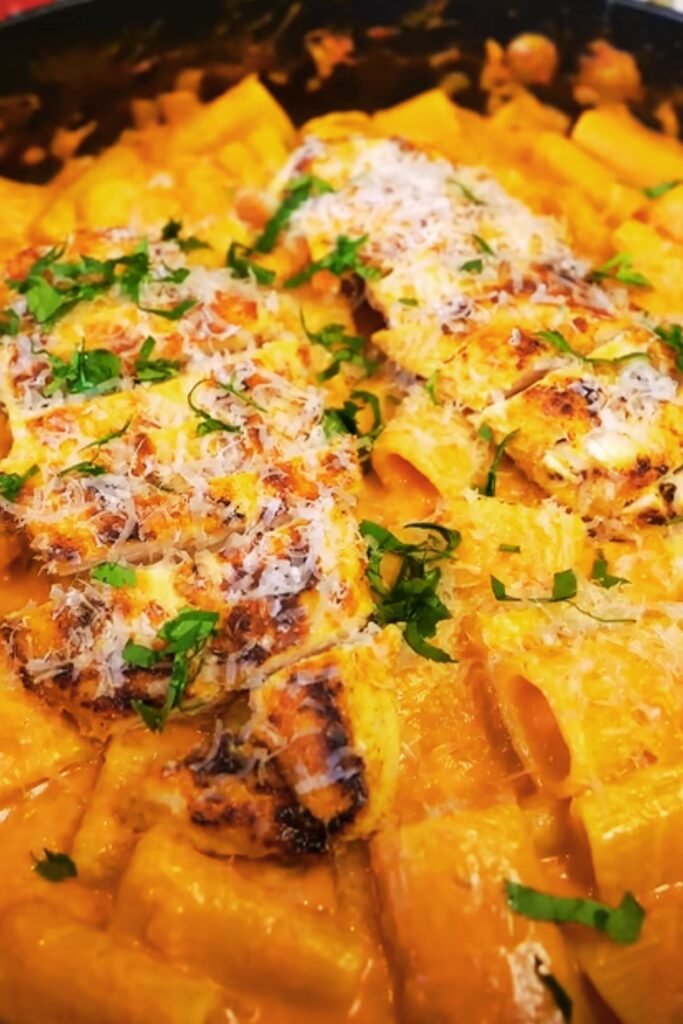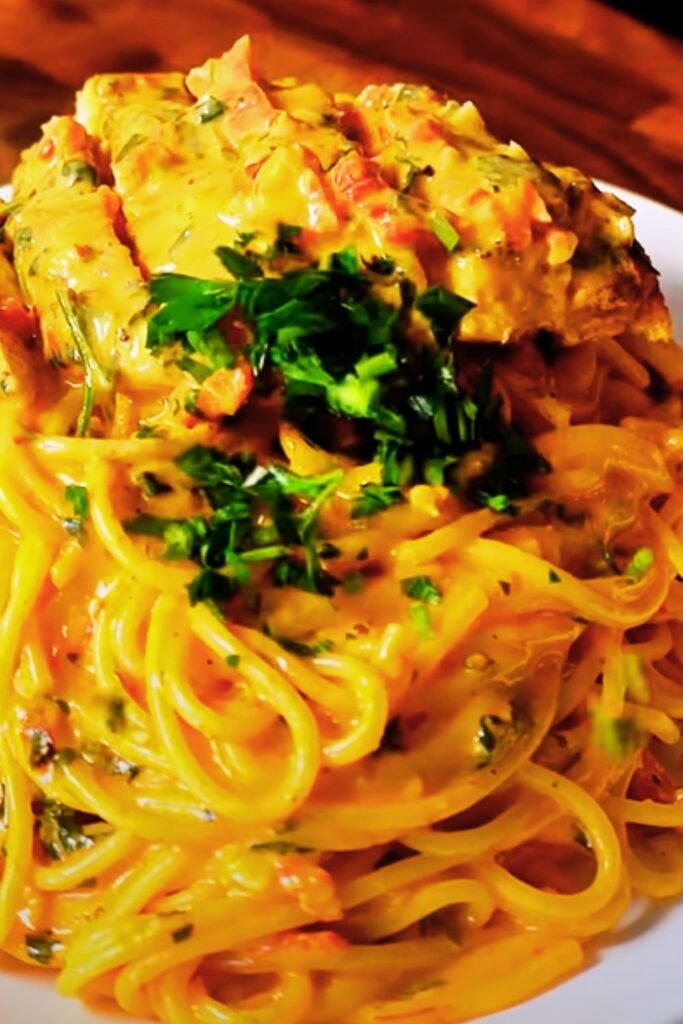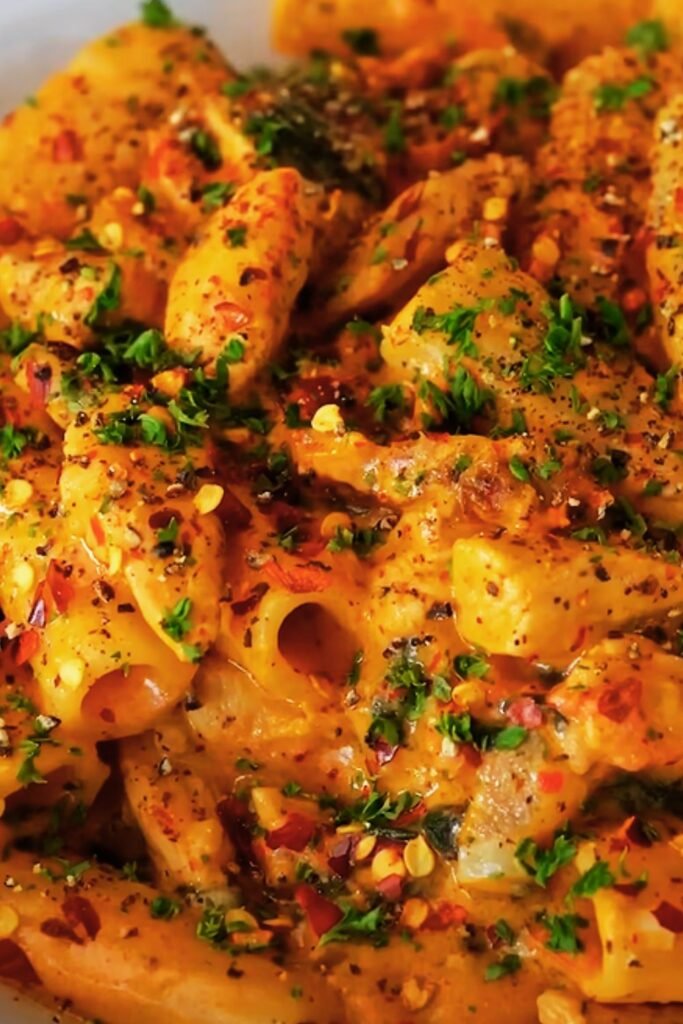When I first discovered cowboy butter, I knew I had stumbled upon something special. This herb-packed, garlicky compound butter has completely transformed how I approach weeknight dinners, especially when it comes to pasta. My Cowboy Butter Chicken Linguine combines the rich, smoky flavors of this viral sensation with tender chicken and perfectly cooked linguine, creating a dish that’s both comforting and exciting.
This recipe has become my go-to when I want to impress dinner guests without spending hours in the kitchen. The beauty lies in its simplicity – while the flavors are complex and restaurant-worthy, the technique is straightforward enough for any home cook to master. I’ve served this to everyone from picky teenagers to sophisticated food lovers, and it never fails to earn rave reviews.
What Makes This Dish Special
The magic happens when traditional Italian pasta meets bold American flavors. Cowboy butter, with its blend of herbs, spices, and garlic, creates an incredibly flavorful sauce that coats every strand of linguine. The chicken adds protein and substance, while the pasta provides the perfect canvas for all these wonderful flavors to shine.
I love how this recipe bridges different culinary traditions. The technique is fundamentally Italian – using pasta water to create a silky sauce – but the flavors are distinctly American with their bold, herbaceous profile. It’s comfort food that feels both familiar and adventurous.
Understanding Cowboy Butter
Cowboy Butter : A compound butter made with herbs, garlic, lemon, and spices that originated as a steak sauce but has become popular for various applications
Compound Butter : Butter mixed with herbs, spices, or other flavorings, then shaped and chilled to create a versatile cooking ingredient
Emulsification : The process of combining fat (butter) with liquid (pasta water) to create a smooth, cohesive sauce
The key to perfect cowboy butter lies in the balance of ingredients. I use fresh herbs whenever possible because they provide brighter, more vibrant flavors than dried alternatives. The garlic should be minced finely to distribute evenly throughout the butter, and the lemon juice adds a crucial brightness that cuts through the richness.

Essential Ingredients Breakdown
| Ingredient | Purpose | Substitution Options | Storage Tips |
|---|---|---|---|
| Unsalted Butter | Base for cowboy butter | European-style butter for richer flavor | Keep refrigerated, soften before mixing |
| Fresh Parsley | Primary herb, adds freshness | Cilantro or basil (changes flavor profile) | Wash, dry thoroughly, store in refrigerator |
| Fresh Chives | Mild onion flavor | Green onion tops, finely chopped | Freeze well for longer storage |
| Garlic | Aromatic base | Roasted garlic for milder flavor | Store in cool, dry place |
| Lemon Juice | Brightness and acidity | Lime juice or white wine vinegar | Fresh is best, bottled acceptable |
| Red Pepper Flakes | Heat and complexity | Cayenne pepper or hot sauce | Store in airtight container |
| Paprika | Smoky depth | Smoked paprika for more intensity | Replace annually for best flavor |
| Chicken Breasts | Protein component | Thighs for more flavor, seafood alternatives | Pound to even thickness for uniform cooking |
| Linguine | Pasta base | Fettuccine, angel hair, or spaghetti | Cook just until al dente |
Step-by-Step Preparation
Making the Cowboy Butter
I always start by making the cowboy butter first because it needs time to meld and can be prepared ahead. Here’s my foolproof method:
- Remove butter from refrigerator 30 minutes before starting to ensure it’s properly softened
- Mince garlic as finely as possible using a microplane or sharp knife
- Chop fresh herbs uniformly to ensure even distribution
- Combine all ingredients in a medium bowl
- Mix thoroughly with a wooden spoon until well incorporated
- Taste and adjust seasoning as needed
The consistency should be smooth and well-blended. I often make extra cowboy butter because it keeps well in the refrigerator for up to a week and can be used on everything from grilled vegetables to crusty bread.
Preparing the Chicken
Getting the chicken right is crucial for this dish. I’ve found that pounding the breasts to an even thickness ensures uniform cooking and prevents dry, overcooked portions.
- Pound chicken breasts to ¾-inch thickness between plastic wrap
- Season generously with salt and pepper at least 15 minutes before cooking
- Heat a large skillet over medium-high heat with a tablespoon of oil
- Cook chicken 6-7 minutes per side until internal temperature reaches 165°F
- Rest for 5 minutes before slicing to retain juices

The resting period is essential – it allows the juices to redistribute throughout the meat, ensuring every bite is moist and flavorful.
Cooking Techniques and Tips
Pasta Cooking Mastery
Perfect pasta is the foundation of any great pasta dish. I always use a large pot with plenty of salted water – it should taste like seawater. This isn’t just about flavor; the salt actually helps the pasta cook more evenly.
Timing is Everything : Start the pasta when the chicken is almost done resting, ensuring everything finishes simultaneously
Reserve Pasta Water : Save at least one cup of starchy pasta water before draining – this is liquid gold for creating silky sauces
Al Dente Perfection : Cook pasta 1-2 minutes less than package directions suggest, as it will continue cooking when combined with the hot cowboy butter
Creating the Perfect Sauce
The sauce comes together through emulsification – combining the fat from the cowboy butter with the starchy pasta water. This technique requires attention but isn’t difficult once you understand the process.
I heat about half the cowboy butter in the same pan used for the chicken (don’t clean it – those browned bits add incredible flavor). As the butter melts, I gradually whisk in pasta water, creating a creamy base. The key is maintaining gentle heat and constant motion to prevent the sauce from breaking.
Nutritional Information and Dietary Considerations
| Nutrient | Per Serving (4 servings total) | % Daily Value |
|---|---|---|
| Calories | 520 | 26% |
| Protein | 28g | 56% |
| Total Fat | 24g | 37% |
| Saturated Fat | 14g | 70% |
| Carbohydrates | 45g | 15% |
| Fiber | 2g | 8% |
| Sodium | 680mg | 30% |
| Vitamin A | 1200 IU | 24% |
| Vitamin C | 15mg | 25% |
| Iron | 3mg | 17% |
This dish provides excellent protein content while delivering significant amounts of vitamins A and C from the fresh herbs. The butter does contribute to higher saturated fat content, but the portion sizes are reasonable for an occasional indulgence meal.
Dietary Adaptations
Gluten-Free Option : Substitute linguine with gluten-free pasta made from rice, corn, or legumes
Dairy-Free Alternative : Replace butter with high-quality olive oil or vegan butter substitute
Lower-Fat Version : Reduce butter quantity and increase pasta water for sauce consistency
Protein Variations : Substitute chicken with shrimp, salmon, or plant-based protein alternatives
Flavor Profile and Serving Suggestions
The completed dish offers a complex flavor profile that balances richness with brightness. The cowboy butter provides an herbaceous, garlicky base with subtle heat from red pepper flakes. The chicken adds savory depth, while the pasta creates a satisfying, comforting foundation.

I typically serve this with a simple arugula salad dressed with lemon vinaigrette to cut through the richness. Crusty sourdough bread is excellent for soaking up any remaining sauce. For vegetables, I often prepare roasted asparagus or sautéed green beans as they complement the dish’s flavors without competing.
The presentation is important too. I like to slice the chicken on the bias and fan it over the pasta, then finish with a sprinkle of fresh herbs and a light dusting of freshly grated Parmesan cheese.
Storage and Meal Prep Tips
This dish is best served immediately, but I’ve developed some strategies for meal prep and storage:
Make-Ahead Components
- Cowboy butter can be prepared up to a week in advance and stored in the refrigerator
- Chicken can be cooked earlier in the day and gently reheated
- Fresh herbs can be washed, dried, and chopped up to two days ahead
Storage Guidelines
| Component | Refrigerator Storage | Freezer Storage | Reheating Instructions |
|---|---|---|---|
| Complete Dish | 3-4 days in airtight container | Not recommended | Gentle stovetop with splash of broth |
| Cowboy Butter | 1 week covered | 3 months wrapped well | Bring to room temperature |
| Cooked Chicken | 3-4 days | 2-3 months | Microwave or gentle stovetop |
| Cooked Pasta | 3-5 days | 1-2 months | Rinse with hot water or microwave |
Reheating Successfully
The biggest challenge with reheating pasta dishes is preventing them from becoming dry or oily. I add a splash of chicken broth or pasta water when reheating, and I always do it gently over low heat, stirring frequently.
Troubleshooting Common Issues
Through making this dish countless times, I’ve encountered and solved various challenges:
Sauce Breaking or Separating : This usually happens from too high heat or adding liquid too quickly. Remove from heat, add a tablespoon of cold butter, and whisk vigorously to re-emulsify.
Dry Chicken : Overcooking is the culprit. Use a meat thermometer and remember that carryover cooking will raise the temperature an additional 5-10 degrees during resting.
Bland Flavor : Insufficient seasoning at multiple stages. Season the chicken, salt the pasta water generously, and taste the cowboy butter before adding to ensure proper balance.
Pasta Sticking Together : Use plenty of water, stir occasionally during cooking, and don’t rinse pasta after draining unless specifically directed.
Recipe Variations and Creative Twists
Once you master the basic recipe, there are numerous ways to customize it:
Protein Variations
- Substitute chicken with jumbo shrimp for a seafood version
- Use turkey cutlets for a leaner option
- Try salmon fillets for omega-3 benefits
- Create a vegetarian version with portobello mushrooms
Pasta Alternatives
- Fettuccine for a wider noodle experience
- Penne for better sauce adherence
- Whole wheat pasta for added fiber
- Zucchini noodles for a low-carb option
Herb Combinations
- Add fresh dill for a unique twist
- Include tarragon for French-inspired flavors
- Mix in fresh oregano for Mediterranean notes
- Try cilantro for a southwestern variation
Pairing and Menu Planning
This dish works beautifully as the centerpiece of a dinner party or casual family meal. I’ve found it pairs particularly well with:
Complementary Side Dishes
- Roasted Brussels sprouts with bacon
- Garlic-sautéed spinach
- Grilled zucchini and yellow squash
- Caprese salad with fresh mozzarella
Beverage Pairings
- Sparkling water with lemon or lime
- Fresh lemonade or iced tea
- Light, crisp sodas that won’t compete with flavors
- Fresh fruit-infused water
The key is choosing accompaniments that either complement the rich, herby flavors or provide a refreshing contrast.
Questions and Answers
Q: Can I make the cowboy butter ahead of time? Yes, cowboy butter actually improves with time as the flavors meld together. I recommend making it at least an hour before using, though it can be prepared up to a week in advance and stored covered in the refrigerator.
Q: What’s the best way to reheat leftover pasta? I reheat gently on the stovetop with a splash of chicken broth or pasta water to restore moisture. Microwave reheating works too, but add liquid and stir frequently to prevent drying out.
Q: Can I substitute dried herbs for fresh ones? While fresh herbs provide the best flavor, you can use dried herbs in a pinch. Use about one-third the amount called for in fresh herbs, as dried herbs are more concentrated.
Q: How do I know when the chicken is properly cooked? The internal temperature should reach 165°F when measured with a meat thermometer. The juices should run clear, and the meat should no longer be pink in the center.
Q: What if my sauce separates or looks oily? Remove the pan from heat immediately and whisk in a tablespoon of cold butter or a splash of cold pasta water. This should help re-emulsify the sauce.
Q: Can I make this dish dairy-free? Absolutely! Replace the butter with high-quality olive oil or a vegan butter substitute. The flavor will be different but still delicious.
Q: How spicy is this dish? The heat level is quite mild with just red pepper flakes. You can adjust the spiciness by increasing or decreasing the amount of red pepper flakes, or by adding hot sauce to taste.
Q: What pasta shapes work best with this sauce? Long pasta shapes like linguine, fettuccine, or spaghetti work beautifully because they allow the sauce to coat each strand. However, shorter shapes like penne or rigatoni also work well for capturing the sauce.
Q: Can I prepare this dish for a large crowd? Yes, but I recommend doubling or tripling the recipe rather than making one enormous batch. This ensures better cooking control and more consistent results.
Q: How long does the cowboy butter keep in the freezer? Properly wrapped cowboy butter can be frozen for up to three months. I like to shape it into a log, wrap it in parchment paper, then place it in a freezer bag for best results.
This Cowboy Butter Chicken Linguine has become one of my signature dishes because it perfectly balances simplicity with sophistication. The combination of familiar comfort food elements with bold, exciting flavors creates something truly special that brings people together around the dinner table. Whether you’re cooking for family on a busy weeknight or entertaining friends on the weekend, this recipe delivers both flavor and satisfaction that will have everyone asking for seconds.